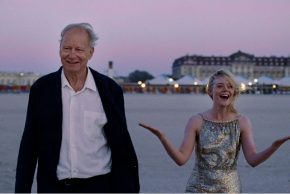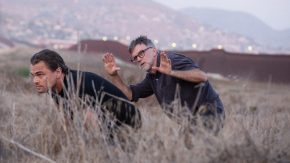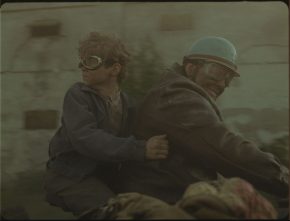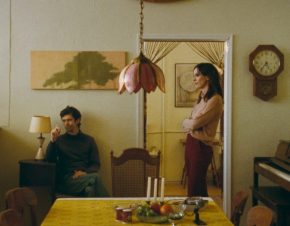In case you have never heard of Portuguese fado music, Lina Cardoso Rodrigues should be your authentic source to get to know it! She has been singing these beautiful songs for many years and even personified a legendary fado singer on stage. Her recent cooperation with musician, composer and producer Raül Refree resulted in a widely acknowledged project called ‘Lina_Raül Refree: Fado Tuned to the 21st Century’, which can be heard in the Müpa on 9 December 2021. Among other things, it was N°1 on the World Music Charts Europe in 2020 and won two prestigious awards given by German and French experts respectively. But why is this project so successful, what is its secret? This is what Lina revealed a lot of details about.
How did the cooperation between you and Raül Refree begin?
I met him through my management, because both of us were interested in doing a project dedicated to fado. We met for the first time, started the recording, and soon it turned out that we can work very well together. Furthermore, we have a very good connection not only in the studio but on stage, too.
How can you explain to a foreigner what fado music is?
In a lexicon, you might find that fado is a kind of traditional Portuguese song that has existed for more than two centuries. As it was mostly delivered orally, it is difficult to say when and where it started, the first historical sources being noted in the 1820s. This is all true, but fado is so much more than that. These are songs that evoke the deepest feelings of pain and love. It is like a religion for us Portuguese: we go to specific places and listen to these songs that express these feelings as if we were at a sacred ritual. The music is a bit similar to flamenco. There are some standard melodies that do not really change, but the lyrics vary from version to version, also involving poetry. I can sing a song with a lot of different lyrics – this is a specialty of fado.
How does it feel to sing and listen to fado? As mentioned, it is not an everyday experience. First you need to find your inner silence, like before a religious service. You need to encounter the melody in this silence and feel how moving it is. It requires full attention and often results in the singer and the audience crying, experiencing an extreme range of emotions. Therefore, what we give in the Müpa is not a simple concert, it is much more than that.
Do you also involve instruments?
Yes, a lot. There are some traditional ones, like the Portuguese guitar, or more modern ones like a keyboard.
I read that you have a special connection to Amália Rodrigues and even played her on stage. Can you tell us more about her?
I remember watching her with my father and grandmother who are not professionals but still like to sing and listen to good music. I could peek into her life and it touched me a lot; my feelings for her have also been special. At a time when her music could be heard everywhere, she inspired me a lot with her songs. I can truly say that Amália was my teacher.
I listened to every album, especially the very important one for both her and the genre (and me), called Busto. In the 20th century, Amália kind of renewed fado, as she recorded a contemporary version of it with contemporary poets. I also need to add that she initially wasn’t very popular in Portugal; she gave her first concert around 42 years of age, after various collaborations and international successes.
And how about you and Raül? Do you also renew the genre?
The spirit of our performance is to play freely, which is a bit different from traditional fado and its specified rhythms. I have more time and space within this performance. It gives me the ultimate freedom. We present, for instance, new interpretations of songs that Amália popularised originally. When I sing through the repertoire, I feel like being in a cathedral, surrounded by silence, and it is a wonderful feeling, it reminds me of flying.
Otherwise, although we are spontaneous and free, we still do not intend to change the tradition. We simply do our music and instinctively put our feelings in it. Fado is still alive and will be alive, there is no need to resurrect it or something. There is some experience that you can only express through songs, and specifically THESE songs.
Can you quote some of these song lyrics?
There is one which is called Gaivota (Seagull) – a melancholic piece about Lisbon. Or another one that explains how it feels being scared about our own feelings, or yet another one that evokes God, spring, nature. There is an actual religious song in our repertoire called Ave Maria.
I love these songs and it would be impossible to choose any favourite. Also because there is no way of singing fado the same time twice. It might be the same song, the same line, but the feeling is always different, depending on the actual mood, the circumstances, the events in someone’s life. Fado can never go boring, on the contrary: it is full of surprises, even for us who do it professionally. I hope that the audience will have the same unique, deep, and unforgettable experience.

























Comments